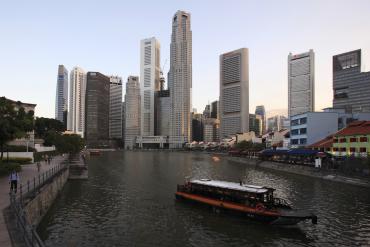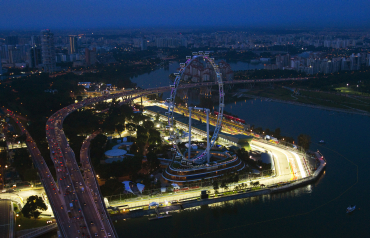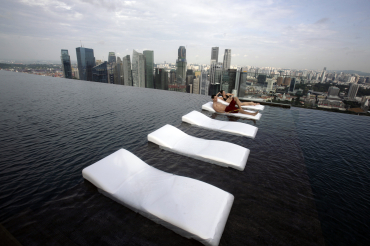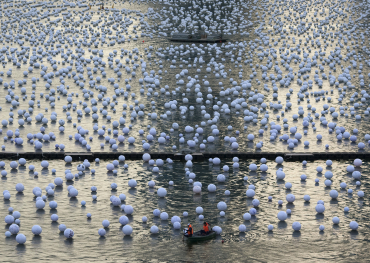Photographs: Tim Chong/Reuters Devjyot Ghoshal in New Delhi
For a country that sits on a mere 710 square kilometres of land, Singapore has the unenviable challenge of balancing economic growth with increasing demands on its environment.
But in making its urban areas more sustainable, the city-state is doing what it is very good at: Setting ambitious targets, involving a wide section of stakeholders and putting in place government incentives.
By 2030, Singapore's government wants 80 per cent of all buildings to be "Green Mark" certified, a benchmarking scheme that incorporates best practices in environmental design and performance, similar to India's Griha (Green Rating for Integrated Habitat Assessment) rating system or the United States's LEED (Leadership in Energy and Environmental Design) certification.
...
Singapore: A country that plans to go completely green
Image: An aerial view shows a section of the illuminated Marina Bay street circuit of the Singapore Formula One Grand Prix.Photographs: Reuters
And while the sustainability drive has its usual suspects - business parks, malls and other commercial properties -, there are some atypical projects that underline the exceptional change underway in Singapore.
McDonald's Jurong Park outlet on the western edge of Singapore is the city-state's first Platinum Green Mark - the highest rating - project in the restaurant category and one of the first "Green" certified McDonald's restaurants in Asia.
The restaurant not only has a grass-lined roof that "reduces solar heat load and improves thermal performance" but also features in-built rainwater harvesting and heat recovery systems, with the latter utilised to "heat water for dishwashing".
The immediate payoff of "greening" the restaurant, according to McDonald's officials, is about 15 per cent savings on energy costs.
...
Singapore: A country that plans to go completely green
Image: A view of the infinity pool of the Skypark that tops the Marina Bay Sands hotel towers.Photographs: Vivek Prakash/Reuters
Interestingly, it was McDonald's that initiated the interest of Singapore's Building and Construction Authority in extending the Green Mark scheme to restaurants, by putting up a handful of its outlets for certification, which BCA subsequently saw as an opportunity to take sustainability beyond commercial and residential infrastructure.
But sustainability is also about good design, especially in a densely-populated city like Singapore where restricted spaces make innovation almost mandatory.
Number 36, Boon Teck Road, a curiously designed terraced house wedged in a row of commonplace residences, became the first Green Mark Platinum certified house in Singapore in May this year.
With an emphasis on allowing maximum natural ventilation and light, the house sits on recyclable steel-frames, uses recycled concrete aggregate, green cement and has recycled timber floors.
...
Singapore: A country that plans to go completely green
Image: A white Bengal tiger shakes its head while standing in a moat in its enclosure at the Singapore Zoo.Photographs: Tim Chong/Reuters
The net impact is estimated carbon-emission reduction of 4.62 tonne per year - the equivalent of saving 22 trees every year.
Nonetheless, as much as new projects are driving Singapore's bid for sustainability, the real "challenge" lies in dealing with existing buildings, admits BCA CEO John Keung.
"The equipment in a building has a certain lifespan. Systems need to be replaced. When the time comes for upgrading or replacement, it's a chance for the owner to do something. If he knows that by installing an efficient cooling system he can save energy then there's a strong case for him to do something."
...
Singapore: A country that plans to go completely green
Image: Workers arrange 'wishing spheres' as part of an art installation on the Singapore River.Photographs: Edgar Su/Reuters
This is why the government has set aside S$100 million to help existing buildings upgrade, with owners being eligible for as much of 35 per cent subsidy when they go for retrofitting.
The government, though, is doing much more. All new Singapore government buildings, as well as those being redeveloped, will achieve the highest Green Mark certification, and by 2020, all government buildings, regardless of age, will also be Green Mark certified.
"We will have to walk the talk; if we don't, nobody will believe us," says Keung.







article